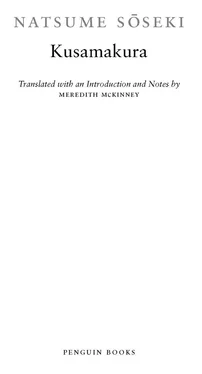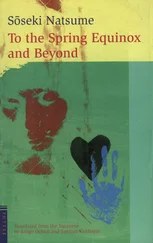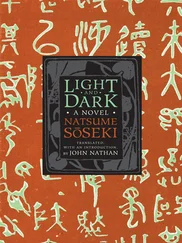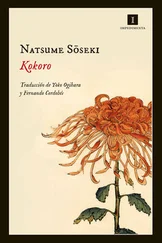Natsume Soseki - Kusamakura
Здесь есть возможность читать онлайн «Natsume Soseki - Kusamakura» весь текст электронной книги совершенно бесплатно (целиком полную версию без сокращений). В некоторых случаях можно слушать аудио, скачать через торрент в формате fb2 и присутствует краткое содержание. Жанр: Старинная литература, на английском языке. Описание произведения, (предисловие) а так же отзывы посетителей доступны на портале библиотеки ЛибКат.
- Название:Kusamakura
- Автор:
- Жанр:
- Год:неизвестен
- ISBN:нет данных
- Рейтинг книги:4 / 5. Голосов: 1
-
Избранное:Добавить в избранное
- Отзывы:
-
Ваша оценка:
- 80
- 1
- 2
- 3
- 4
- 5
Kusamakura: краткое содержание, описание и аннотация
Предлагаем к чтению аннотацию, описание, краткое содержание или предисловие (зависит от того, что написал сам автор книги «Kusamakura»). Если вы не нашли необходимую информацию о книге — напишите в комментариях, мы постараемся отыскать её.
Kusamakura — читать онлайн бесплатно полную книгу (весь текст) целиком
Ниже представлен текст книги, разбитый по страницам. Система сохранения места последней прочитанной страницы, позволяет с удобством читать онлайн бесплатно книгу «Kusamakura», без необходимости каждый раз заново искать на чём Вы остановились. Поставьте закладку, и сможете в любой момент перейти на страницу, на которой закончили чтение.
Интервал:
Закладка:
I put down my pencil and consider. The problem lies in attempting to express such an abstract conception in the form of a picture. People are not so very different from one another after al , and no doubt someone else among them al has felt the touch of this same imaginative state and tried to express it in eternal form through one means or another. If this is the case, what means might he have used?
As soon as I pose this question, the word “music†flashes before my inner eye. Yes, of course! Music is the voice of nature, born of this kind of moment, pressed into being by its necessity. Now I realize that one should listen to and study music; unfortunately, however, I myself am quite unacquainted with this field.
I next turn my attention to the third expressive domain, that of poetry. I recal the German writer Lessing saying something to the effect that events whose occurrence depends on the passage of time constitute the realm of poetry, and pro-pounding the fundamentalist theory that poetry and painting are essential y different.3 Seen from this viewpoint, the realm I am urgently attempting to present to the world seems likely never to find its expression in poetry. Time may certainly exist in the mental state that gives me my delight, but it contains no events that develop through time. My ecstasy is not produced by A’s ending and being replaced by B, which in turn disappears for C to be born. My joy is of a thing held motionless inside the one profound moment, and the very absence of motion means that when I try to translate the experience into common language, the material I use ought not to be arranged to flow within time. As with a picture, the poem should be composed simply by arranging objects in space.
But what scene ought I bring to the poem in order to depict this nebulous and insubstantial thing? Once I achieve that, the poem wil succeed even if it doesn’t fit with Lessing’s theory. Talk of Homer and Virgil is irrelevant. If poetry is a suitable vehicle for expressing mood, that mood need not be portrayed through chronological events; as long as the simple spatial requirements of a picture are fulfil ed, the language of the poem wil be adequate to the expressive task.
But what does theory matter? I have largely forgotten the contents of Lessing’s Laocoön, but if I were to look thoroughly into it, I imagine I’d only become confused. Since I have failed to produce a picture, I decide at any rate to try a poem, and pressing my pencil to the page of the sketchbook I rock myself to and fro, waiting for something to emerge. I continue in this way for some time, hoping somehow to be able to move the point of my pencil from where it rests on the page, but quite without success. The experience feels rather like suddenly forgetting the name of a friend, having it on the tip of your tongue but being unable to produce it. You know that if you give up trying, the elusive name is likely to sink forever beyond reach.
Imagine you set out to mix a gruel of arrowroot. At first your chopsticks merely churn the powder and feel no resistance from the liquid. If you persevere, however, the liquid slowly grows viscous, and your hand grows heavier as it stirs. Continuing to stir without pause, you final y reach the point where you can stir no longer, and in the end the arrowroot gruel in the pan wil , of its own accord, positively rush to glue itself to your chopsticks. This is precisely the process of writing a poem.
At last my lost pencil begins to find its way on the page, in fits and starts, gathering impetus as it goes, and after twenty or thirty minutes I have produced these few lines.
The spring is at its height,
My sorrow burgeons with the grasses.
Soundless, the flowers fal in the quiet garden.
The lute lies neglected in the vacant room.
In her web the spider sits unmoving.
An ancient scrawl of smoke curls at the eaves.
When I read it over, I realize it is in fact a string of images that could easily become a picture. I might as wel have made it a picture in the first place, I decide. Then I wonder why a poem was easier to create than a picture. Having reached this point in my poem, the rest seems likely to fol ow without too much effort, but now I feel the urge to write sentiments that are impossible to transpose into a picture. After much hesitation over the possible choices, I final y produce the fol owing:
Sitting silent in this quiet world
I sense a faint light deep within me.
The human world is thronged with busyness
Yet how could one forget such peace?
By chance I gain a day’s serenity
and learn how hectic is the life of man.
Where might I place this deep expansive calm?
It belongs only to the realms of eternal sky.
I read it through from the beginning. It is not without merit, but it seems rather too dry and dul to real y convey the exalted state I’ve just been in.
While I’m at it, I decide to try another poem. Gripping my pencil, my eyes stray unconsciously toward the doorway—and at this moment the door is slid open, and I catch a sudden glimpse of a beautiful shape beyond, slipping quickly across the three feet or so of open space. Good heavens!
By the time my eyes have ful y turned to take this in, the door is open and the figure is disappearing. The movement is over almost before my eyes can catch it, and the shape passes and disappears in an instant. My gaze is now riveted on the doorway, al thoughts of poetry abandoned.
Within a minute the figure re-emerges across the way. Silent and serene, the woman walks along the second-floor balcony opposite me, clad magnificently in a long-sleeved formal kimono. The pencil fal s from my hand. I stare across the twelve yards or so of courtyard garden, breath held, while the lone figure appears and disappears, parading graceful y to and fro at the balcony railing as the evening spring sky, already freighted with cloud, grows gradual y heavier with the promise of rain.
The woman has said not a word, nor sent so much as a glance in my direction. She walks so softly that even the sound of her own silk hem trailing behind her would not reach her ears. She is too distant for me to distinguish the details of the dyed colors in the lower half of the kimono; al I can make out is the transition, where the kimono’s basic color merges into the design below, a delicate shading reminiscent of the boundary between night and day, that boundary that she too treads.
I know not how many times this figure in her trailing kimono walks up and down the long balcony corridor nor how long she has performed this strange perambulation in her astonishing clothes. Nor have I the least idea what her intention might be. It’s a weird feeling, to watch her endlessly repeating her ritual, coming and going, appearing and disappearing in the frame of my doorway, so decorously and so silently, for reasons beyond my ken. If her action is some lament for the passing spring, why should it take such an insouciant form? And why should this nonchalant pose choose to clad itself in such finery?
Is it perhaps gold brocade that makes the obi at her waist so startle the eye as this spectral shape, this hue of the dying spring, for an instant entrancingly brightens the doorway’s dark depths? Moment by moment the gaudy brocade comes and goes, swal owed now into the blue depths of evening, into unpeopled remoteness, now returning hither through those far reaches of space. The sight is redolent of the twinkling stars of spring that sink at dawn into depths of violet sky.
At last the heavens are on the verge of opening to swal ow this bright shape into the realm of darkness. There is something supernatural about the scene, the figure dressed in clothing appropriate to a vibrant life surrounded by golden screens and silver candelabras, “each instant of spring’s evening worth a wealth of gold,†wil ingly fading without fear or resistance from the visible world. As I gaze at her through the swiftly gathering darkness, she seems to linger serenely in one place, then tread with the one measured step, without haste, without bewilderment. If she indeed has no knowledge of the impending peril of the darkness, she is the height of innocence.
Читать дальшеИнтервал:
Закладка:
Похожие книги на «Kusamakura»
Представляем Вашему вниманию похожие книги на «Kusamakura» списком для выбора. Мы отобрали схожую по названию и смыслу литературу в надежде предоставить читателям больше вариантов отыскать новые, интересные, ещё непрочитанные произведения.
Обсуждение, отзывы о книге «Kusamakura» и просто собственные мнения читателей. Оставьте ваши комментарии, напишите, что Вы думаете о произведении, его смысле или главных героях. Укажите что конкретно понравилось, а что нет, и почему Вы так считаете.












